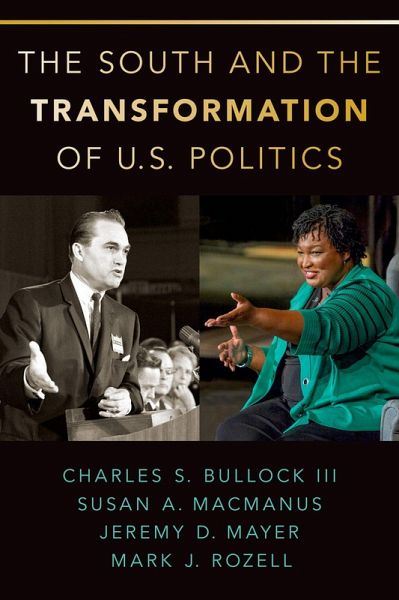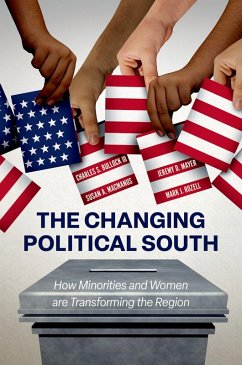
The South and the Transformation of U.S. Politics (eBook, PDF)
Versandkostenfrei!
Sofort per Download lieferbar
13,95 €
inkl. MwSt.
Weitere Ausgaben:

PAYBACK Punkte
7 °P sammeln!
A strong case can be made that the South has had the greatest impact of any region on the transformation of U.S. politics and government. Since 1968, we have seen the demise of the "solid (Democratic) South" and the rise of the Republican-dominated South; the rise of the largely southern white evangelical religious right movement; and demographic changes that have vastly altered the political landscape of the region and national politics. Overriding all of these changes is the major constant of southern politics: race. Since the 1990s, the Republican Party has dominated politics in the Souther...
A strong case can be made that the South has had the greatest impact of any region on the transformation of U.S. politics and government. Since 1968, we have seen the demise of the "solid (Democratic) South" and the rise of the Republican-dominated South; the rise of the largely southern white evangelical religious right movement; and demographic changes that have vastly altered the political landscape of the region and national politics. Overriding all of these changes is the major constant of southern politics: race. Since the 1990s, the Republican Party has dominated politics in the Southern United States. Race relations were a large factor in this shift that began about a half century ago, but nonetheless, race and demographic change are once again realigning party politics in the region, this time back toward an emergent Democratic Party. Membership in the Southern Democratic Party is majority African American, Latino, and Asian, and rapidly expanding with an influx of immigrants, primarily Latino. While race continues to shape politics in the region, population growth is, as this book argues, the major factor affecting politics in the South. In fact, the populations of Georgia, North Carolina, South Carolina, and Virginia have grown more rapidly than the population of the nation as a whole over the past half century--and each of these states has gained at least one seat in Congress. These growth states are the ones in which populations are diversifying, economies are surging, and Democrats are making headway. They, along with Florida and Texas, are also among the most competitive states with the largest numbers of Electoral College votes in the region. It is likely, therefore, that among the key battlegrounds for determining the presidency will be the southern states with the fastest growing populations. This will especially be the case once the Latino population in Texas mobilizes. This book describes and analyzes the ways in which demographic change has shaped politics in the South since the late 1960s and may enable the Democratic Party in the future to re-take politics in the region, and even shut out Republicans from the nation's highest office.
Dieser Download kann aus rechtlichen Gründen nur mit Rechnungsadresse in A, B, BG, CY, CZ, D, DK, EW, E, FIN, F, GR, HR, H, IRL, I, LT, L, LR, M, NL, PL, P, R, S, SLO, SK ausgeliefert werden.













